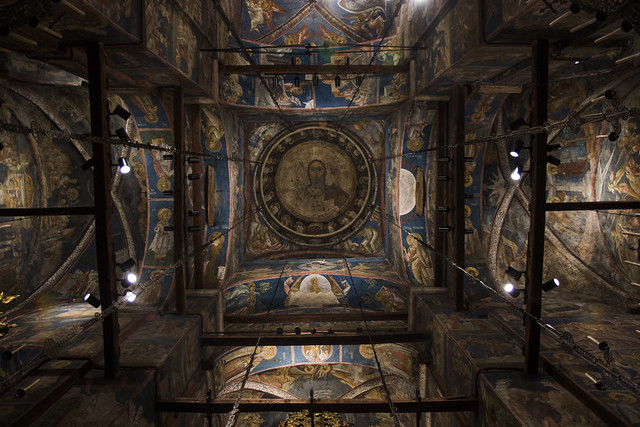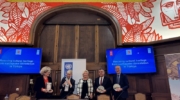Inclusion of the Dečani Monastery on the 2021 List of 7 Most Endangered heritage sites in Europe
Statement by the Board of Europa Nostra adopted at its meeting held on 1 June 2021 (PDF)
In reaction to the announcement of the inclusion of the Dečani Monastery on the 2021 List of the 7 Most Endangered programme run by Europa Nostra in partnership with the European Investment Bank Institute, some misguided and inaccurate information was communicated via (social) media. We therefore decided to offer additional clarification about the purpose and standard procedure of this programme, and the decision to include the Dečani Monastery on this year’s List.
Since its launch in 2013, our 7 Most Endangered programme has selected a total of 43 endangered heritage sites in 26 European countries, including a series of important sites located in the Balkans. For example, last year, our 2020 List of 7 Most Endangered included the National Theatre of Albania in Tirana, which was regretfully demolished in May 2020, and the Belgrade Fortress and its Surroundings in Serbia, which is still under threat by an inappropriate cable-car project. Thanks to a joint commitment and collaboration of all parties concerned, many selected sites have been saved and consequently don’t figure anymore on our lists of endangered sites, including the Roman Amphitheatre in Durrës in Albania (2013 List) and the Synagogue in Subotica in Serbia (2014 List).
For this year’s list, our colleagues from the European network Future for Religious Heritage, a most respected and active member of our European Heritage Alliance, nominated 3 endangered heritage sites, one located in France, one in Spain and another one in Kosovo*. All 3 sites have been selected for the shortlist of 12 sites and two of them have been included in the final list of seven sites.
As it is known, the Dečani Monastery figures, since 2006, on the World Heritage List in Danger, as a component of the property entitled “Medieval Monuments in Kosovo, Serbia”. It is thus part of one of the only three World Heritage sites located in Europe which also figure on the World Heritage List in Danger; the other two being the historic centre of Vienna, Austria (on our list since 2018), and the historic Maritime Mercantile City of Liverpool, UK. Since 1999, Dečani Monastery has been under continuous international military protection.
By nominating this site for our 7 Most Endangered List, this European network wished to encourage Europe’s wider mobilization for eliminating any remaining obstacles to a holistic safeguard of this world heritage treasure. The nomination dossier was prepared on the basis of publicly available information and documentation via the UNESCO website and via international media channels and information of public knowledge as well as on the basis of due conversation with the representative of the monastic community of this living religious site.
On the basis of all nomination dossiers, the Advisory Panel, composed of 16 experts from across Europe and beyond, decided on a shortlist of 12 endangered sites including the Dečani Monastery. This was a regular procedure, which was undertaken as in all previous cases.
Subsequently, the Advisory Panel and the Europa Nostra Board received a letter of concern from Cultural Heritage without Borders, a heritage NGO that is a member organisation of Europa Nostra from Kosovo and is also collaborating with Europa Nostra in the EU-funded project consortium ILUCIDARE. We then had a related online meeting with the Director of this NGO. In addition, we have received a letter of concern from, at the time, Acting President and Prime Minister Designate of Kosovo. Europa Nostra duly and respectfully answered both letters, confirming the plan to visit Kosovo as soon as the epidemiological situation allows such travels. We also thanked the representatives of public authorities and civil society from Kosovo for their dedication to the protection of multi-cultural heritage in Kosovo, and for their readiness to meet with representatives of Europa Nostra for discussion on topics of common concern.
After a thorough examination of the nomination dossier, the views expressed by the Advisory Panel, as well as the two letters of concern mentioned above, the Europa Nostra Board decided that the Dečani Monastery should be included in the final list, and this for a series of valid reasons as explained in the press release announcing the 2021 List of 7 Most Endangered heritage sites in Europe. As in previous years, this List is not intended to pronounce any sort of condemnation but to bring together all stakeholders and to promote dialogue between them to find a lasting solution to save endangered heritage. As such, it is normally welcomed by national and local authorities concerned.
Following the online announcement on 8 April 2021 of this year’s List of 7 Most Endangered, we have now appointed expert task forces that will examine in more detail the current situation of the 7 endangered sites and will first organise online conversations with all parties concerned. As soon as possible, most probably after the summer, these expert task forces will also visit the selected sites and will thereafter publish detailed and comprehensive reports with recommendations and suggestions for future action to ensure the sustainable and lasting safeguard of these endangered sites. This standard procedure, applied ever since the launch of our programme in 2013, has also been followed with regard to the Dečani Monastery.
The Dečani Monastery – with its outstanding architecture, frescoes, intangible heritage and its surrounding cultural landscape – constitutes simultaneously a World Heritage and a shared European heritage. It has a special significance for the cultural and spiritual identity and heritage of Serbian people and it is also important for all citizens in Kosovo, as an invaluable element of the multicultural and multireligious heritage in Kosovo. Therefore, safeguarding this exceptional site for present and future generations is a shared responsibility of all stakeholders, religious and secular ones, from local and national to European and international levels of governance. We remain convinced and would like to especially emphasize that this site should not be a source of conflict or division but, on the contrary, should serve as a valuable link between all citizens who are committed to European values and who are dedicated to restoring dialogue and peace between various communities, with due respect of their cultural and spiritual identity and heritage. In this case it could also work as a powerful vector of wellbeing and sustainable development for citizens and their communities, locally and in the wider region, e.g. through attracting sustainable and responsible cultural tourism.
All Europa Nostra’s policies, actions and decisions have been and will always be guided by European values and principles. We have always acted as the European Voice of Civil Society committed to Cultural Heritage, tangible and intangible, beyond and above borders. As such, we have developed strong and fruitful collaboration with a wide range of international organisations, and especially with UNESCO, the Council of Europe and in particular with all EU Institutions.
Through our 7 Most Endangered Programme, together with our large European network of members and partners, Europa Nostra remains committed to act as a catalyst for positive change which will be beneficial for Europe’s shared cultural heritage and also for the better future and wellbeing for Europe’s society as a whole.
* This designation is without prejudice to positions on status, and is in line with UNSCR 1244/1999 and the ICJ Opinion on the Kosovo declaration of independence.
Read & download statement in PDF
Sara Zanini
Europa Nostra
sz@europanostra.org
+32 486 58 95 19









